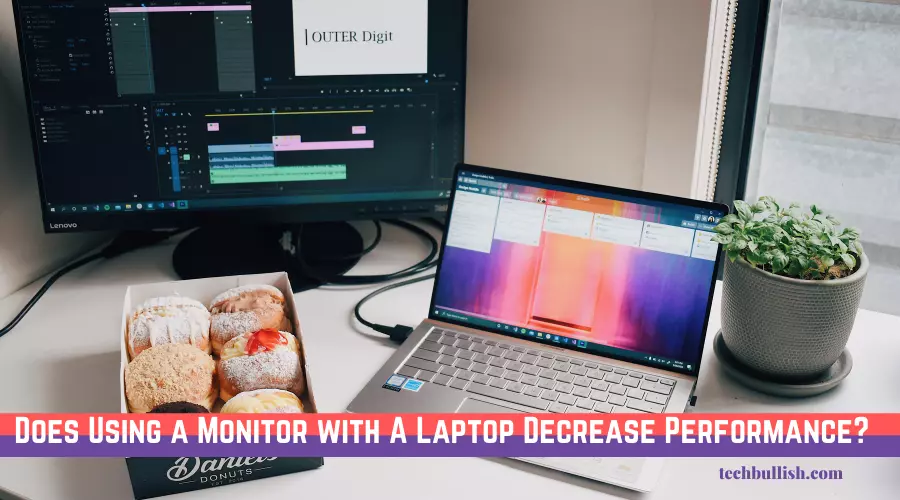If you are using a laptop for your regular work or any other purpose, you might be limited by its screen size.
If you connect a larger monitor to your laptop, it will improve your productivity.
But, Does using a Monitor with A Laptop Decrease Performance?
This blog will discuss this and help you know if you can use a monitor with your laptop.
Let’sLet’s get started!
Does Using a Monitor with A Laptop Decrease Performance?
The effect of connecting a laptop to an external monitor depends on the resolution, the applications running, and the graphics processor on the laptop.

Generally, using a good quality monitor with a good specification laptop does not decrease its performance.
Let’sLet’s look into the factors:
Resolution
A monitor with the exact resolution or lower resolution will not affect the performance of your laptop.
However, a different monitor with a lower resolution than the laptop will lower performance.
For example, if you have a high-end laptop and a low-end monitor, you can improve performance by upgrading your monitor.
But, if you have a high-end monitor and a low-end laptop, you won’t notice much of a difference, and your laptop will still bottleneck whatever you throw at it.
Type of applications
The answer to the question of whether using a monitor with a laptop decreases performance or not depends on the type of applications being used.
For Applications:
If you use a graphics-heavy application, then the laptop’s graphics card will be the limiting performance factor.
For Gaming:
Some games tend to be more graphically intensive than others. In such a case, connecting an external monitor will affect the performance.
A user will not experience challenges with performance if they are using the laptop for business purposes only.
Graphics processor
A laptop with a powerful graphics processor will respond better when connected to a monitor than a laptop with a weaker graphics processor.
Using a laptop with integrated graphics and a lower resolution monitor, you will get better performance at a lower screen resolution.
But if you are using a laptop with a higher resolution monitor, you will get better performance at higher screen resolutions.
Docking Device
Another consideration when connecting a monitor is the docking device. Docking stations and laptops go hand in hand, and they are designed to connect so that you can use your laptop on a larger screen and with more ports.
The docking device needs to have the necessary capabilities for handling the monitor, including a variety of ports, such as for USB devices or external hard drives.
For example, a docking station that uses USB type-C’s alt mode will not have the same performance as another one, DisplayLink technology.
Is it bad to connect a laptop to a monitor?
Connecting a laptop to a monitor is not bad as long as it is done correctly, and this is because laptops are designed to run on one or more monitors.
You can connect your laptop to a monitor to get a better experience.
If you’re a gamer, you would want to play on a big screen, or if you are working on a large project that requires you to view multiple pages simultaneously, you would also want to connect your laptop to a monitor to get the best experience.
Does an external monitor increase or decrease FPS?
There is a common misconception that connecting your laptop to an external monitor will affect the performance, specifically the FPS in gaming.
This is why many people are hesitant to connect the laptop to an external monitor.
Connecting your laptop to an external monitor will not affect the FPS. The only way to get a lower FPS is if the external monitor has a lower refresh rate than the laptop.
Therefore, you should always consider the refresh rate capability before purchasing an external monitor.
This is also why most monitors have higher refresh rates than laptops.
Does a monitor connected to a laptop by HDMI affect the laptop’s performance?
While you may think that using an HDMI cable to connect your laptop to an external monitor will boost the performance of your machine, this is not the case.
Connecting a monitor to a laptop via HDMI will not affect performance as long as the resolution selected is compatible with your computer. The video card must also support the resolution of the external monitor you are using.
If your laptop has multiple video outputs, you can also connect a second monitor to your laptop. Just make sure that the resolution displays perfectly for both monitors.
Some laptops even have more than three video outputs, so you can take advantage of this if you want to connect more than two monitors to your laptop.
Conclusion
Let’sLet’s conclude the post on If using a Monitor with A Laptop Decreases Performance!
A good monitor can improve your productivity and comfort and even help you avoid eye strain and headaches.
But it’s easy to fall into the habit of using your laptop screen as your only display, and it’s not necessarily bad to do that.
But if you’re constantly working on a laptop, it’s a good idea to plug in a monitor for a few hours every day.
I also connect an external monitor with my laptop, working fine.
I hope you enjoyed reading the post.

I’m Anirban Saha, Founder & Editor of TechBullish. With a B.Tech in Electronics and Communication Engineering, and 6+ years of experience as a software developer, I have expertise in electronics, software development, gadgets, and computer peripherals. I love sharing my knowledge through informational articles, how-to guides, and troubleshooting tips for Peripherals, Smart TVs, Streaming Solutions, and more here. Check Anirban’s Crunchbase Profile here.
